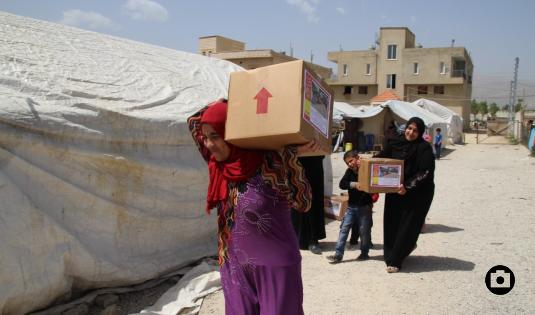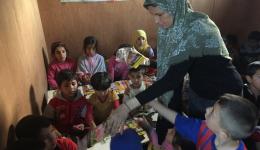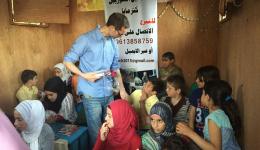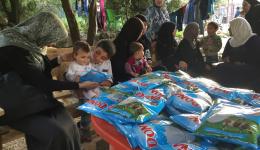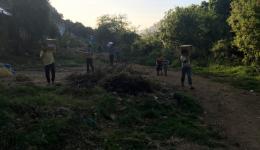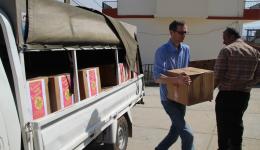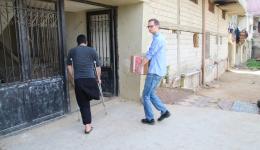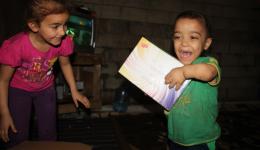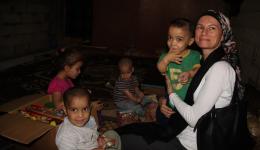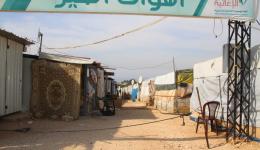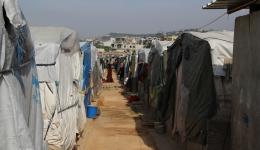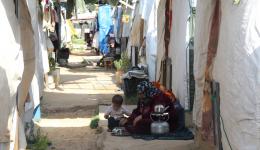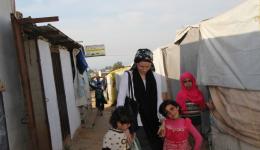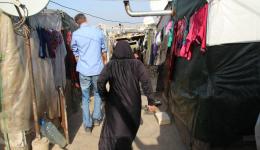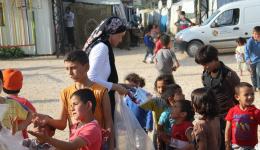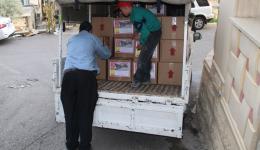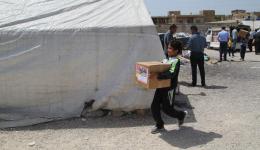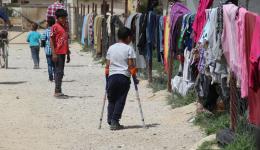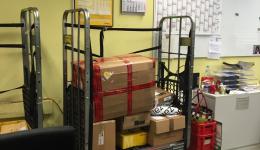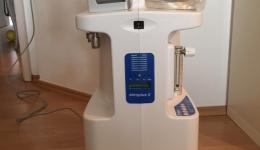Registered Nonprofit
Association for the Support
of Children and Needy
People Around the World
Unterstützung
Republic of Lebanon
Sat, June 25, 2016 - 10.15pm
Oxygen concentrator well arrived
The package with the oxygen concentrator has safely arrived in Lebanon, and our friend Ahmed has brought it to the young man who needs it urgently at night!
THANK you, Ahmed for your great work !!!
Tue, May 3, 2016 - 08:58 pm
Oxygen concentrator shipped to refugee camp in Lebanon
This morning, Alexandra and Tanja shipped an oxygen concentrator to Lebanon. In a refugee camp in Lebanon, a young man whom Michael and Alexandra visited recently urgently needs this medical device for a long-term oxygen therapy. He is suffering from thalassemia and renal insufficiency, and pneumonia. Michael has ordered the unit here in Germany. Today, it was best possibly packed packaged and delivered to the postal services, and our friend Ahmad in Ketermaya, near Beirut, will bring it reliably to the right place! Thanks to Ahmad and his family in Ketermaya !!!
Mon, April 11, 2016 -10:35am
Safely returned home
This morning Michael and Alexandra safely landed in Frankfort. The 4-hour flight and the drive home went smoothly.
Both were joyfully welcomed, especially Moritz, Lisa-Maria and Tanja were happy to hug their dad/husband  .
.
This journey was over quickly, however, many people living in miserable conditions could be supported.
Moreover, the team could establish many new contacts for the future.
Sat, April 9, 2016 - 10.45pm
Reports from Lebanon
Part 2
Our friend Ahmed agrees to accompany us the next day to camps in northern Lebanon and to organize a food supply action. Each of the 70 boxes which will be distributed to the neediest families as well as to widowed women and disabled persons contains a number of essential foods worth 50 Dollars: rice, lentils, flour, pasta, sugar, etc.
In view of the fact that a widow with three children we have met during distribution currently receives just 35 Dollars per month and has to additionally earn by occasional work 5 more Dollars to be able to survive, this package greatly helps. The selected families are therefore very happy with this donation.
We painfully realize once more that the financial resources of our organization are not sufficient to meet all needs. Therefore, sometimes we can give only loving gestures and words, hugs, listen and hope that in the future we will be able to do more.
Overall, an estimated total of 1.5 million Syrian refugees live in Lebanon while its native population of only 6.2 million inhabitants. Most of the refugees live in tent camps, a large part of them also in rented apartments. The poorer ones live in shell constructions or barren garages. The problems of people without a regular income or assets brought along are similar. Wealthier people have probably already traveled to other countries. Therefore, we feel that we are at the right place in view of the objectives and the philosophy of FriendCircle WorldHelp.
In a small shop in a large tent camp in Akkar we buy many chip packages to make the children happy. Outside one of the shops that are integrated in one small living room there is a young man of about 25 years. His skull has a large dent on the forehead caused by chemical weapons in Syria which also led to his complete blindness. As he tries to help his wife get the requested chip bags carefully hung on sacks on the wall he loses his balance and stumbles into the hut. This sight makes time stand still for a moment and again the question rises in us: “Why must there be wars? Nothing can ever justify the resulting consequences and the suffering of people!”
During the distribution of the food packages we meet the 46-year-old Raeda. She sits on the ground in front of one of the huts made of metal walls. She is mentally seriously ill. We are told that she had to watch her husband and her four children being slaughtered right before her eyes. Raeda cannot speak anymore. When somebody comes near she reacts in panic and begins to scream loudly. Her old mother lovingly cares for her and gives her daughter sometimes some old broken cell phones and toy phones. With those Raeda thinks to call her loved ones.
In the news on Internet and television, we often see ruined houses and lands where destroyed souls live. Orphans sometimes cross our way and smile at us as if they had forgotten what they have lost. We see it as a blessing that in Syria the family enjoys the highest priority which makes that there is always a single grandmother or a new family naturally taking care and integrating the orphans.
Men with severe leg injuries due to the war walk on crutches or sit in wheelchairs. They also smilingly wave at us.
Pain and hope are here very close. Our mind, which we use so frequently at home, cannot absorb and sort these situations.
Part 3
We learn that a large number of Syrian refugees live in the Bekaa plain in eastern Lebanon, adjacent to Syria. With our friend Ahmed we decide that also there we would like to visit refugee camps. A total of about 400.000 people of Syrian descent live in Lebanon in camps. Some of the camps get a lot of attention from major international organizations, others do not. Our new friends from Al-Biqa, a town in the Bekaa plain are selecting needy people for the distribution of 100 additional food rations from FriendCircle WorldHelp.
The circumstances in the two camps that we visit are extremely neat, clean and cultivated. With utmost hospitality the people offer us tea – without sugar. Lovingly, the father of one family gives each of us a little sweet and is happy as we accept it. As so often in poor families we note once more that those who hardly have anything readily share the little they have.
When talking to people we find out that many families have lost relatives in the war and then fled. This is especially hard under current circumstances for the widows since usually there is no one left who by earning even a small wage would sustain the family.
Sorely afflicted people tell us that the war does not spare pregnant women, mothers and children so that grandmas and aunts have to step into the breach and take care of the children. The food packages from FriendCircle WorldHelp are urgently needed in these families. Although no one knows when an organization will finance a next delivery, at least the essential foods for the next few weeks are now available and life goes on. Also here, the period of regular financial monthly support has ended for many families in the last months and the future is therefore uncertain.
During the days we spend with our Lebanese friends we also learn about the situation of the Palestinian refugees in Lebanon. We decide to visit a camp to find out where FriendCircle WorldHelp can possibly provide support. Many Palestinians live already in the third generation in Lebanon since their ancestors fled from war in their homeland in the late 40s of the 20th century. Since then there are always more of their countrymen coming due to the tense situation in their homeland. It is impossible for them to return home. The elderly suffer from the fact that neither themselves nor their offspring can return to Palestine. A 2001 law also forbids them to purchase an apartment or a house outside the densely populated and truly stifling camps. In summary one can say that they are nowhere welcome. Outside Lebanon, they are not allowed to travel freely and in Lebanon they can only live in camps of lowest standards: excluded and forgotten – imprisoned and humiliated. Ruled out from public law, without voting rights and the right of regular work they also receive no medical care or financial assistance.
We reach the camp on a back street. The official entrance is monitored by the army for reasons unknown and an access authorization is only available after a lengthy procedure. We see simple, narrow, mostly three-story buildings, extending to an area of about one square kilometer and forming a maze in which not even the residents can everywhere stay oriented.
In the narrow streets no sun is shining, it is cool and dark. Provisional electrical cables in the narrow corridors hang almost down to our heads, here and there a water pipe is lacking and rivulets are flowing. Narrow spiral staircases lead to the upper floors. Our companions are tense since they have introduced us illegally. We visit some families who kindly invite us into their small dwellings to tell us their concerns. Approximately 25-30% of people are suffering from a hereditary form of anemia (thalassemia). Some are so severely affected that they need regular blood transfusions. It is difficult for them to procure the money for these treatments and only by waiving other necessities such as healthy food. Often the entire family has to pool the money for the treatment of a family member. A small local organization helps as much as possible. Also FriendCircle WorldHelp supports some widows and seriously ill people to lighten their burden.
We continually feel the tension of our companions though they try to hide it. Suddenly we are told to immediately leave the labyrinthine camp by separate routes. Alexandra is asked to quickly return to the car together with a Palestinian woman who had accompanied us through the apartments. Michael is to follow by a different route with the men, also in two separate little groups. Initially, no reasons are mentioned, but later it turns out that there are civilian “spies” in the camp who cooperate with “officials” and that we may have been seen by a suspect person. Therefore, we can this time not visit any more needy families in this camp to offer our help - but definitely next time!
THANKS to all friends at home. Only your support makes the work of FriendCircle WorldHelp successful!!
Fri, April 8, 2016 - 10:30pm
Exploratory trip in the Republic of Lebanon
Several days ago, Michael and Alexandra traveled to Lebanon, from Frankfort by plane to Beirut, the capital of the Republic of Lebanon.
They kept in contact with the family of Michael and Frank in the back-office by WhatsApp. Every now and then they found a WLAN to send a short message of a few words to Germany. Meanwhile contacts have been established and new friendships have been made. Together with a companion they already visited several refugee camps, thereby not only getting an impression of the situation but also giving direct and unbureaucratic support.
Below you will find the first lines and three photos that have just arrived:
First report on Lebanon
On April 3rd Michael and Alexandra fly on behalf of FriendCircle WorldHelp to Beirut, Lebanon, to explore the situation in the Syrian refugee camps, as so far we have only get fragmentary information from the press.
In the evening we tell the staff at the front desk of our hotel who we are and what our plans are. Immediately the men at the reception are extremely helpful and do a number of phone calls. Finally we get a contact with a man who knows the refugee camps throughout Lebanon. A meeting is agreed upon for the following day. In the early morning after breakfast we head to Ketermaya south of Beirut.
After about one hour’s drive we meet Ahmed who will accompany us right at a small camp with 35 Syrian refugee families. Each family has an average of five to seven children. Many have lost children or parents during the war. A 64-year-old woman has lost all her relatives – five children and her grandchildren. Here, this long-suffering and kind soul is taking care of five orphans between four and 10 years for whom she is now a mother-substitute.
These encounters cause us at the same time feelings of pain and hope which will remain with us during the whole trip.
We inspect the whole camp which though being simple makes a solid impression. It consists of simple dwellings built of wood and tarpaulins, containing the bare minimum to survive. The interior of all cabins is clean and looks very tidy with the few belongings.
We learn here and later on at other places that unfortunately financial support programs by large international organizations have been drastically reduced in recent months and partly completely stopped. In addition, the refugee camps are not recognized by the Lebanese government, making them basically illegal. These circumstances give the refugees a constant feeling of insecurity regarding their future stay the regular supply of food, etc.
Fortunately, the water supply here in Ketermaya is ensured by a state-owned connection with a nearby supply basin and large water basins next to the cabins. However, there is a shortage of many things. Mothers have no milk for babies and children. In the two cabin-like sheds serving as a school room, there is rarely any learning material. One of the teachers, whose name is Ischme, is only 13 years old and does whatever she can do with the available resources.
We have a long discussion with Ahmed, our new friend who is working for a local organization, on the situation and we find a lot in common. We are very pleased to find out that he shares our philosophy to start work immediately. Therefore, we decide to purchase and distribute the same day school supplies and powdered milk for the children. After shopping in the city, we hand out the milk powder to the deeply grateful and happy mothers. Quietly and patiently they reach out their hands during distribution in order not to be overlooked.
When we arrive at the two small rooms made of press boards, all children are already waiting obediently on the benches. During distribution we realize what a simple pencil means for these children. Radiant, happy children’s eyes look at us and the wave of enthusiasm and acknowledgement is almost not abating.
Lebanon (officially: Republic of Lebanon; Arabic الجمهورية اللبنانية) is a country in Western Asia on the Mediterranean. Lebanon borders in the north and east on Syria and south along the Blue Line on Israel. In the west it is bordered by the Mediterranean Sea. Lebanon is among the Mashreq countries and the Levant. The up to 3,000 meter high Mount Lebanon is snowy in winter. From its white peaks derives the country's name, originating from the Semitic root lbn ("white").
Climate:
Depending on the different regions of Lebanon, the climate varies greatly. The coast has a Mediterranean climate with dry, warm summers and damp, rainy winters. In the mountains, there is a pronounced mountain climate, and the major precipitation also falls in winter, mainly as snow. On the border with Syria, there is a dry steppe climate, representing the segue to the desert climate of southern Syria and Jordan. In Beirut, the daytime temperatures amount to an average of 18 °C in January and 30 °C in July and August. In December and January, there is an average of 11 rainy days in Beirut, while August generally remains completely dry.
Population:
According to estimates from 2015 (see The World Factbook) the Republic of Lebanon, the smallest country in continental Asia, has currently about 6.2 million inhabitants.
Due to its location between Israel and Syria and the continuing conflicts in the region 1.5 million of them are refugees (Syrians, Palestinians, among others).
The population density of 563 inhabitants per km² is more than twice as high as in Germany, with the majority of the population living in cities. Nearly half of all Lebanese live in the capital Beirut and its suburbs.
Sources:
https://de.wikipedia.org/wiki/Libanon#cite_note-1
https://www.cia.gov/library/publications/the-world-factbook/geos/le.html
